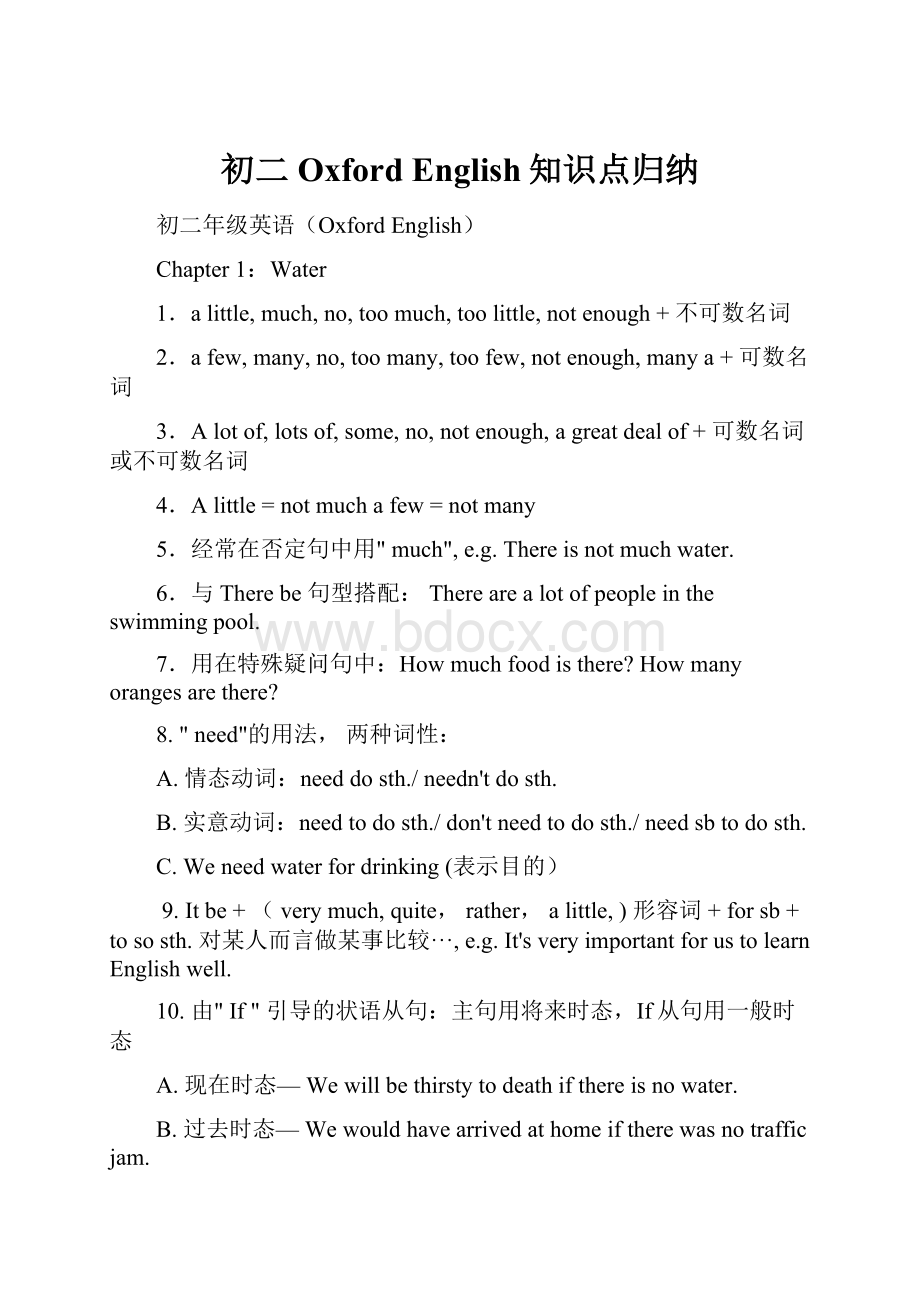初二Oxford English知识点归纳.docx
《初二Oxford English知识点归纳.docx》由会员分享,可在线阅读,更多相关《初二Oxford English知识点归纳.docx(21页珍藏版)》请在冰豆网上搜索。

初二OxfordEnglish知识点归纳
初二年级英语(OxfordEnglish)
Chapter1:
Water
1.alittle,much,no,toomuch,toolittle,notenough+不可数名词
2.afew,many,no,toomany,toofew,notenough,manya+可数名词
3.Alotof,lotsof,some,no,notenough,agreatdealof+可数名词或不可数名词
4.Alittle=notmuchafew=notmany
5.经常在否定句中用"much",e.g.Thereisnotmuchwater.
6.与Therebe句型搭配:
Therearealotofpeopleintheswimmingpool.
7.用在特殊疑问句中:
Howmuchfoodisthere?
Howmanyorangesarethere?
8."need"的用法,两种词性:
A.情态动词:
needdosth./needn'tdosth.
B.实意动词:
needtodosth./don'tneedtodosth./needsbtodosth.
C.Weneedwaterfordrinking(表示目的)
9.Itbe+(verymuch,quite,rather,alittle,)形容词+forsb+tososth.对某人而言做某事比较···,e.g.It'sveryimportantforustolearnEnglishwell.
10.由"If"引导的状语从句:
主句用将来时态,If从句用一般时态
A.现在时态—Wewillbethirstytodeathifthereisnowater.
B.过去时态—Wewouldhavearrivedathomeiftherewasnotrafficjam.
C.将来时态—TheywillgotoAmericaniftheygettheirpassportandVisa.
11.英语中分数词的表达法:
A.用“基数词+序数词”表示:
其中基数词表示分子,序数词表示分母,分子除用one外,也可用a;如果分子大于1,分母要用复数形式。
但是,1/2不能说a(one)second,而要说a(one)half。
E.g.onetenth,atenth,twofifths,ahalf,threeeighths,aquarter,threequarters,onefourth,threefourths,
B.分数修饰名词时,若该名词是不可数名词只能用单数;若是可数名词,用单数或复数均可。
但是,若它们在句子中作主语,则谓语动词是用单数还是复数取决于名词,即与分数所修饰的名词保持一致。
例如:
Onlyone-fifthofairconsistsofoxygen.氧气只占空气的1/5。
Abouttwothirdsofthestudentsattendthemeeting.大约2/3的学生都参加了会议。
C.用“基数词+介词+基数词”表示:
借助介词表示分数,介词前的数词是分子,介词后的数词是分母,一般介词用"outof,of,in,to".例如:
.Ninety-ninepeopleoutofahundred,iftheywereaskedwhofirstfoundAmerica,wouldanswerClumbus.如果要问是谁首先发现美洲,一百个人中有九十九个(百分之九十九)将回答是哥伦布。
12.Until一词的用法:
A.当谓语动词是延续性动词时,用肯定形式:
Youcanwaithereuntilhelpcomes.(直到..才)
B.当谓语动词时非延续性动词时,用否定形式:
Shedidn'tgotobeduntilherdaughtercameback.(直到她女儿回来了她才睡觉)
C.是否用not要取决于动词时延续性还是非延续性的,即使动词用否定形式,在翻译成汉语的时候都要说成“直到...才...”。
D."itwasnotuntil....that....",强调句型。
Itwasnotuntilherdaughtercamebackthatshewenttobed.
E.Notuntil放在句首,句子要倒装:
Notuntilherdaughtercamebackdidshegotobed.
12.常用短语:
Believeitornot,flushthetoilet,atleast,pourintothesink,wastewater,cleanup,inthefirstplace.
Chapter2Schoolnewspaper
1."suggest"用法:
建议,暗示,同义词"advise",
A.Suggest+doingsth.:
Shesuggestsgoingshoppingatweekend.
B.Suggest+that(should)dosth.Hesuggestedthatschoolshouldholdasportsevent.
2.Takechargeof=beinchargeof,由...负责;beinthechargeof...某物在某人的掌控之下
Shetakeschargeofallbooksinthelibrary.
Sheisinchargeofallbooksinthelibrary.
Allbooksinthelibraryisinthechargeofher.
3."ask"的用法:
asksb(not)todosth./askforhelp,sth.../askababoutsth.
Heaskedmetofetchwater
HeasksmeaboutthewhetherinEngland.
Heasksforhelp.
4."howoften,多久...';Howoftendoyoutakeexercise?
5."agree"的用法:
A.agreewithsb.同义某人的观点,意见,想法,分析:
Inmyopinion,weshouldnotplaycomputergamesfrequently.—Yes,Itotallyagreewithyou.
B.Agreetosth.表示一方提出意见,观点,计划,另一方写作,Weagreetotheirarrangement.
C.Agreeon/uponsth:
指双方通过协商而取得一致意见,Weagreeontheprice.
D.Agreetodosth.=agreeondoingsth.同意某人做某事Theyagreetoconcludethemeetingsoon.(不能用agreesbtodosth.)
6.Inoneweek'stime=oneweeklater表示在一星期之后,一般用于将来时。
7."finish"用法:
finishdoingsth./finishsth完成某事
8."takepartin"&"joinin"&"join"的用法:
A.Takepartin,常指参加某活动,聚会等:
ShetookpartinHelen'sbirthdaypartyyesterday.
B.Joinin,常指参加某活动,聚会等:
Wouldyouliketojoininthedancingwithus?
C.Join常指参加某团体,组织,军队等:
PupilsareproudofjoiningYoungPioneer.
9.Should&oughtto:
两者都“应该”,用法基本相同,区别在于:
(1)oughtto比should语气强,should表示主观看法,一些建议,劝说时,译作“应当”。
oughtto,直接接动词原形,更多反映客观情况,“有义务”或“必要”做某事,译为“应当,应该”
(2)
(2)oughtto的否定就表示做某事一定是错误的而should的否定就表示某动作不一定要做。
A.I/You/He/She/We/Theyshould+dosth=I/You/He/She/We/Theyoughttodosth
B.I/You/He/She/We/Theyshouldnot+dosth=I/You/He/She/We/Theyoughtnottodosth
C.I/You/He/She/We/Theyshouldn'tdosth=I/You/He/She/We/Theyoughtn'ttodosth
E.gSheoughttotakecareofhersister.=Sheshouldtakecareofhersister.
Yououghtn'ttobelateforschool.Youshouldn'tbelateforschool.
10.感叹句形式:
A.Whata/an+形容词+名词+主语+谓语
B.How+形容词、副词+主语+谓语
E.g.Whatabeautifulgirlsheis!
=Howbeautifulgirlsheis!
Whatanexcitingnewitis!
=Howexcitingthenewis!
Howquicklyheran!
11.Hundredsof,thousandsof,millionsof,billionsof...成百上千,成千上万,成万上亿...
12.常用短语:
holdameeting,electthechiefeditor,votefor(为..投票),takechargeof=beinchargeof,askfor,takenotes(of),beresponsiblefor,takeover,befreetoreaders,payforsth.,agreetodosth.Concludethemeeting,bringthemeetingtotheend,giveoutnewspaper(出版),commonsense,putamarkon,writedown,attheNewYear'sParty,inall(总共),marcharoundthestreet,takepartin,attheend(of),intheend,takeplace,beonfire(着火),bebornin(出身于),sciencefictionfilm,adventurefilm,whatashame,congratulations!
Welldone,youdeservetowin.Longtimenosee.I'msorrybut...,findout.
Chapter3DetectivesandCrimes
1.The+adj.:
表示一类人,theold老人,theyoung年轻人,theguilty有罪之人,当这类词做主语时,谓语动词要用三人称单数形式:
e.g.Theoldalwaysneedstobetakencareof.
2."protect"用法:
protectsbfromdoingsth,保护某人....不受影响,相当于"preventfrom".阻止某人受...影响。
Thegovernmenttriedbesttoprotectlocalvillagersfrombeingthreatenedbytheflood.
Thegovernmenttriedbesttopreventlocalvillagersfrombeingthreatenedbytheflood.
3."deny"用法:
denydoingsth.E.g.HedeniedstealingLi'sbag.
4."admit"用法:
admitdoingsth.承认做某事。
Sheadmittedtakingawayherroommate'scamera.
5.非谓语动词(infinitives):
todo&doing两种形式
A.refuse,offer,decide,fail,pretend,agree,promise+todosth.(只能加不定式)
B.区别remembertodosth./doingsth.,Stoptodosth./stopdoingsth.,forgettodosth./forgetdoingsth.,liketodo/likedoing,trytodosth/trydoingsth,goontodosth/goondoingsth,meantodosth./meandoingsth.
C.Enjoy,practice,finish,admit,suggest,avoid,deny,forgive,+doingsth.(只能加动名词)
D.Begin/start/learn+todosth=doingsth.加动名词和不定式意思相近。
6."On+具体时间",HewenttohospitalonMay8th,2011.
7."knockatone'sdoor"敲某人的人···
8.常用短语:
protecttheinnocent,aswellas,findtheguilty,alone,locksthinthesafe,reportthetheft,lookforclues,thesameas,nolonger,notatall,breakintoone'shouse(破门而入),gotojail/gotoprison,behindbar(在监狱中),fakemoney(假钱),inthecaseof...,insteadof,shortofsth.(缺少东西),playgameswithsb.,shareinformation,bumpinto.
Chapter4ComputerTechnology
1.形容词的比较级与最高级:
形容词有三种等级:
原级、比较级、最高级。
A.原级:
句中只有一者时用原级,其标志词是very,so,too,quite,rather等修饰。
e.g.Hishandwritingisverygood.他的书法很好。
(一个人不作比较。
)
B.比较级和最高级构成:
1)单音节或少数双音节词一般在原级后加er构成比较级,加est构成最高级。
e.g.small—smaller—smallest
young—younger—youngest
2)以不发音的字母e结尾的形容词,直接加r或st构成比较级和最高级。
e.g.Nice—nicer—nicest
late—later—latest
3)以辅音字母+y结尾的形容词,变y为i,再加er或est,构成比较级和最高级。
e.g.Busy—busier—busiest
heavy—heavier—heaviest
4)在重读闭音节中,末尾只有一个辅音字母的形容词,要先双写这个辅音字母,再加er或est,构成比较级和最高级。
e.g.hot—hotter—hottest
big—bigger—biggest
5)多音节词前加“more”构成比较级,加“most”构成最高级,形容词的最高级前要加the,副词的最高级前面可省略the。
6)有些词语没有最高级,因为它本身就是最高级,例如:
favorate/favourate.
7)个别形容词的比较级和最高级是不规则变化,需个别记忆。
e.g.good(well)—better—best
bad(badly,ill)—worse—worst
many(much)—more—most
Little—less—least
Far—father——farthest或further—furthest
C.形容词各级用法归纳:
1)原级(同级)比较:
as…as…;notas(so)…as…
We’llgiveyouasmuchhelpaswecan.
Sheisn’tas(so)activeinsportsasbefore.
2)比较级:
表示两者之间比……更……可用状语much,alittle,even等修饰:
HemadefewermistakesthanIdid.
HeisevenricherthanI.
3)最高级:
形容词最高级前必须加the,副词最高级前常省略the,后面多用of……,in……短语表示范围:
Itwasthemost/leastinterestingstoryIhaveeverlistened.
Heisthetallestofthethree.
4)如果在两者之间表示“最……”时要在比较级前加the,而且还用ofthetwo,ofthepair短语:
Johnisthecleverofthetwoboys.
Ofthetwoboys,Johnistheclever.
5)表示是最··中的一个用“oneofthemost.../形容词的最高级”句型。
Yangtzriverisoneofthelongestriverallovertheworld.
6)表示“第几...”用“the+序数词+最高级+名词单数”:
TheYellowriveristhesecondlongestriverintheworld.
7)"themore...,thebetter"句型:
越...越...
Themoreexerciseyouhavetaken,thehealthieryouwillbe.
8)比较级+and+比较级,表示“越来越...”,
Drinkingwaterwillmakeyoulookmoreandmorebeautiful.
2."prefer"的用法:
1)后接不定式时与ratherthan或insteadof连用:
Hepreferredtodieratherthan(to)steal./Heperferredtodieinsteadofstealing.他宁死也不去偷窃。
2)注意介词搭配,如:
Ipreferswimmingtoskating.(Ilikeswimmingbetterthanskating.)我喜欢游泳胜过滑冰。
prefer因其本身含有比较之意,而不可再与more或most连用。
3)prefer+名词或动名词“宁愿”,“更喜欢”:
HecomesfromShanghai,soheprefersrice.他是上海人,因此更喜欢吃米饭。
Iprefergoingbybike.我宁愿骑单车去。
Ipreferthewhiteone.我喜欢那个白的。
4)prefertodo“愿意做”。
Iprefertogoatonce.我愿意马上就走。
5)prefersb.todo“愿意某人做”
Ipreferyoutogooutatonce.我倒希望你马上就走。
6)prefersthtosth./preferdoingsth.todoingsth.“宁愿做...而不做...”.
Ipreferteatomilk.我宁愿喝茶也不喝牛奶。
IpreferwatchingTVtogoingout.我宁愿看电视也不出去。
7)prefertodosth.ratherthandosth.“宁愿做...而不做...”,但是不能说prefersthratherthansth
IprefertowatchTVratherthangoout.我宁愿呆在家里也不出去。
7、prefer+that从句“宁愿”(从句一般用虚拟语气)
Ipreferthatyoushoulddoit.我宁愿你做这件事。
3.Inthe1960s,意为“在20世纪60年代”
4."way"的用法:
1)"thewaytodosth."表示做某事的方法:
Therearemanywaystolearnaforeignlanguagewell.
2)"thewayofdoingsth."表示做某事的方法:
Therearemanywaysoflearningaforeignlanguagewell.
3)"onone'swayto+地名",在某人去某地的路上;也可以引申为“在某人做某事,成为。
。
。
的路上”
ShewasonherwaytoschoolwhenIcameacrossherthisafternoon.
Hehasbeenonhiswa